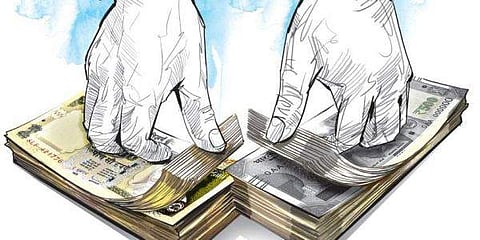

HYDERABAD: Believe it or not, the total expenditure by all political parties and their candidates in the recently-concluded elections to five State Assemblies is a whopping Rs 14,000 crore, a study says. Reportedly, Telangana contributed to the lion’s share of this money-guzzling exercise, spending as much as Rs 5,000 crore in the elections.
Apart from the money spent to lure voters into their favour, the parties splurge their cash on a plethora of other platforms in the hopes of winning the elections. The result? The country’s expenses keep increasing, election after election.
“As the poll expenditure keeps rising, it will increase the corruption in governance as well,” points out N Bhaskara Rao, founder chairman of Centre for Media Studies (CMS). Bhaskara Rao is a pioneer of social research in the country, doyen of poll surveys and an eminent mass communication expert. He shared his surveys and observations on the recent Assembly elections in Chhattisgarh, Madhya Pradesh, Mizoram, Rajasthan and Telangana, with Express on Friday.
According to him, the increase in poll expenses is being made at the cost of democracy. “I recall Kakani Venkata Ratnam giving notes of Rs 2 to a few voters during the 1962 Andhra Pradesh Assembly elections. In 1981, it became Rs 10. In 2002, each vote in their favour got Rs 100 in return, which became Rs 500 in 2014. Today, in 2018, certain Assembly segments witnessed the distribution of up to Rs 2,000 per person,” Bhaskara Rao said.
“The country is not realising that more the poll expenditure, more the corruption in the country. There is a direct connection. Poll corruption is the mother of all corruptions. A candidate who spent money in the elections will try to get more money after winning. It is a vicious cycle,” Rao expressed his concerns.
The country’s total expenditure in the 2014 elections was Rs 30,000 crore. “It is likely to touch Rs 50,000 crore in 2019,” Rao states, lamenting that no political party, ECI or Supreme Court was taking the issue seriously. In the Karnataka Assembly elections last year, the total poll expenditure was Rs 9,000 crore, he added.
“I call this phenomenon ‘note for vote’. In just the three days before the Assembly elections, cash amounting to around Rs 150 crore was seized in Telangana. This is besides liquor and gold,” Rao said. On the other hand, no individual candidate ha spent the official election expenditure limit in the elections. “Each candidate is eligible to spend Rs 28 lakh. However, the details submitted by them indicate that they have not spent more than Rs 14 lakh or so. If that is the case, then why is ECI increasing the election expenditure limit of the candidates?” Rao wondered.
Money blown hither and thither
Earlier, money was being spent only on mainstream methods of campaigning. However, with the advent of the technology, the candidates are now spending a lot of money on social media. In what used to be a rarity back in the day, the party leaders use fancy choppers to get from place to place. With the new trend of individual candidates themselves conducting surveys to assess the election results, money is being spent on that as well.
The number of cars being used by the candidates or by their followers have also increased. Same is the case with the number of political workers being engaged by the parties or candidates for electioneering. The new category that were formed during this elections are middlemen, who are paid by the newly contesting candidates or by their respective political parties. Expenses increase with a new category of expenditure in every election, Rao explained
POLL SURVEYS - A BUSINESS?
“As a doyen of poll surveys in the country, I owe an apology to the nation for introducing them,” Bhaskara Rao said. Rao opined that the poll surveys could be blamed for many ills that have accumulated in the electoral system. The surveys made polls a more expensive affair. “They made polls and parties more manipulative, in the name of strategy and objectivity. Surveys are the reason for the “note for vote” tendency and they have done much damage to the fundamentals of the parties. The surveys promoted public relations, not parties or voters” Rao lamented
REFORMS - NEED OF THE HOUR
“many poll campaign practices have to be reformed,” rao says The reforms he suggests are as follows
Joint campaigns by candidates, instead of each of them
campaigning separately
Whenever the contest is between parties, corruption is more. So, polls other than Lok Sabha and Assembly, party-less candidates should be brought in
Only door-to-door campaigns and handbills should be allowed for the campaign process
Restrain and regulate poll surveys, as they are adding to the problem
The public meetings during elections should be limited
Each candidate/party should only talk about their own manifesto. They should not spend money to debunk the opponents.
Poll time duration should be reduced to 15 days.
Double the voters, double the notes
When compared to the 2014 elections, the number of voters who received money from politicians this time has nearly doubled. “More than 50 per cent of Telangana’s voters got money,” Bhaskara Rao observed. In 2005, the first study on poll expenditure across the States revealed that an average of 25 per cent of the voters voted for money.
A study in 2007 showed that the practice was not limited to the poor or illiterate, but is common across all sections of society. “The voter does not realise that for every Rs 500 they get, they will end up paying 5 to 10 times more as bribe in the next five years, even to avail basic public services,” Rao said